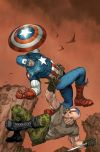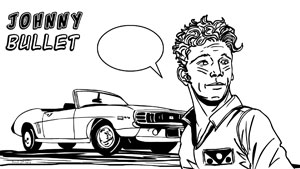|
|
 Even this cover, bringing to mind a circle or Ouroboros, the dragon who eats itself, questions the polarity of contemporary worldviews. |
This is truly a superhero comic where there are no good guys. Yes, one could argue Captain America is the good guy here, a fairly ignorant individual who is experiencing an over-the-top response to a fairly minor crime, but is ignorance (or, as this argument may frame it, innocence) an excuse? If you look at Ultimate Captain America in The Ultimates 1 & 2, you can see his frozen state between 1945 and 2001 is problematic, both socially and politically. He doesn’t integrate very seamlessly, using outdated methods of conflict resolution, probably most famously with Hank Pym outside a bar, and outdated ideologies about war to simplify the post-9/11 world into us and them, good and evil, the victims and the attackers. This last distinction is the big one because, as Captain America continues to stand for the public that puts symbolic power into him, his lack of historical knowledge really reinforces the victim discourse that simplified the actions against the Middle-East by America. Captain America’s awakening in this issue, his education, is an awakening of America in general, but his refusal of the knowledge, mostly because of the complications Aaron puts in the antagonist, is quite the political commentary as well. This is what makes this series so interesting, it isn’t scared and it isn’t making things clear cut. Ultimate Nuke may have knowledge Captain America needs to consider and integrate into both his actions and politics, but he is also using child soldiers and committing crimes he blames America for, using the crimes themselves as a justification for further infractions.
Artist Ron Garney is easily as politically aware and subversive as Aaron’s script. I especially love his use of the American flag and Captain America’s outfit throughout the issue. The recap page sets this dynamic right away with Nuke’s flag, much sharper and glittering than Captain America’s uniform. Both have ideas of their nation and both see themselves as right, but neither are wholly correct, the flags, the images can never meet. The difference is, as reinforced by Aaron’s writing, Captain America can get out of his costume, ‘Ultimate Nuke’ can’t, willingly so. Garney’s art keeps the characters’ politics and ideologies at the right distance visually and never hesitates to let the colours and symbols of the United States be complicated by the characters and their actions, it’s quite incredible how well Garney maintains Aaron’s complex character and national relations through his careful use of the distinctive features of each character.
Grade: A Politically poignant and compelling. A noticeable step forward for the Ultimate Line in general, indeed, for such complicated characters as national superheroes in general.
© Copyright 2002-2021 by Toon Doctor Inc. - All rights Reserved. All other texts, images, characters and trademarks are copyright their respective owners. Use of material in this document (including reproduction, modification, distribution, electronic transmission or republication) without prior written permission is strictly prohibited.

